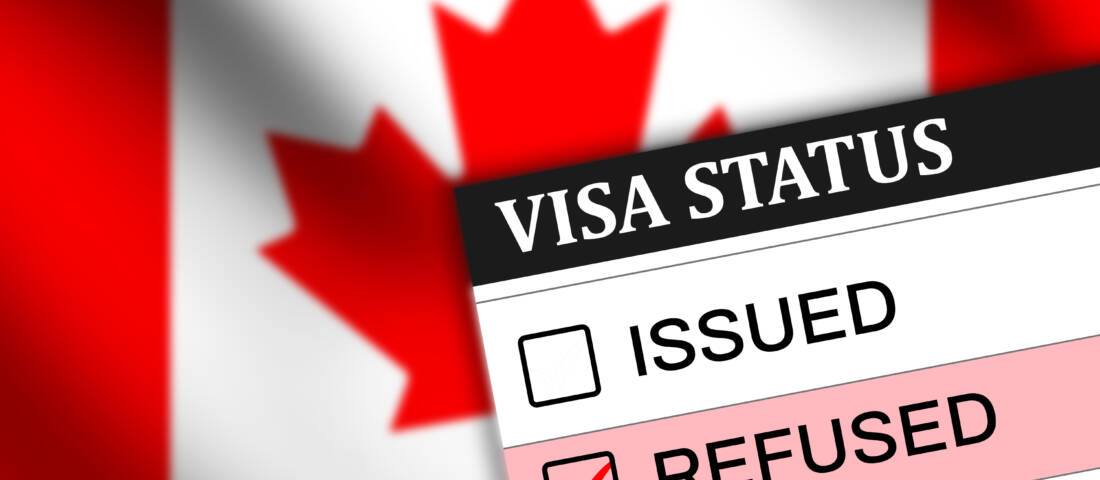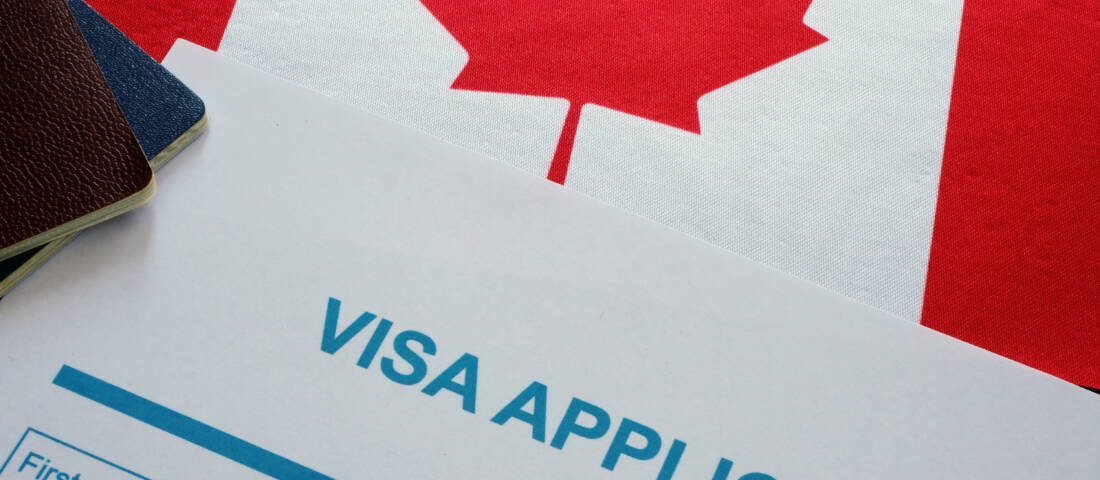A visa refusal in Canada can feel like a major setback, but it doesn’t have to be the end of your immigration journey. Whether you applied for a visitor visa, study permit, work permit, or permanent residence, receiving a refusal can be discouraging, especially when your future plans or business goals depend on it.
At Ackah Business Immigration Law, we understand how frustrating and confusing a refusal can be. The good news is that it is possible to turn things around.
Refusals often stem from incomplete documentation, unclear purpose of travel, or gaps in financial or employment history. You can address these problems with the right strategy, but it truly is best to get legal guidance before submitting documentation on your own.
This guide walks you through what causes a visa refusal in Canada, what to do next, and how to rebuild your case with confidence.
Understand Why You Were Refused
One of the most important first steps after a visa refusal in Canada is understanding exactly what went wrong. Immigration officers are required to provide reasons for denial; however, these reasons can sometimes be vague or overly technical. By identifying the root cause, you can determine whether your case can be strengthened or appealed.
Common Reasons for Visa Refusals in Canada
Most visa refusals fall into a few key categories. These include:
- Incomplete or inconsistent documentation — Missing forms, lack of translations, or unclear supporting documents can lead to immediate refusal.
- Weak ties to home country — Officers must be convinced you will return after your visit or permit expires. If your application doesn’t demonstrate strong family, financial or employment ties to your home country, it may be refused.
- Insufficient financial support — If the IRCC doubts you can support yourself in Canada or questions the legitimacy of your financial documents, your application may be rejected.
- Unclear purpose of travel — When the reason for your visit, study or work is vague or poorly supported, officers may not think your intentions are genuine.
- Previous immigration history — Past visa overstays, refusals or deportations can raise red flags unless fully disclosed and explained.
Check the Refusal Letter
After a refusal, you will receive a refusal letter outlining the official reasons your application was denied. Review it carefully. It may list specific concerns or use standardized language.
While helpful, these letters often lack detailed insight. That’s why many applicants request their case notes (GCMS or CAIPS notes), which provide a fuller explanation of the decision-making process.
Ackah Business Immigration Law can help interpret your refusal letter, identify what went wrong and build a stronger application if you choose to reapply or appeal.
What to Do After a Visa Refusal in Canada
A visa refusal in Canada can feel like a major setback, especially when plans, investments or family reunification are on the line. But it’s not the end of the road. With the right strategy, you can turn a refusal into a stronger, more successful application. Here’s how:
Step 1: Stay Calm and Review the Decision
Receiving a refusal letter can be disheartening, but it’s important to respond with clarity, not panic. Start by reading the decision thoroughly. The letter will typically outline the specific reasons why your visa was denied. This is your starting point for rebuilding a stronger case.
Make note of any missing documentation, unclear information or eligibility concerns. Each point mentioned in the refusal gives you insight into how to improve your next application.
Step 2: Gather All Supporting Documents
Once you understand the refusal, begin gathering any documents that could help address the concerns raised. This might include updated financial records, employment letters, relationship evidence or explanations of ties to your home country. If your application lacked detail, now’s your chance to clarify and strengthen every aspect.
Being proactive here is critical. IRCC often refuses applications due to incomplete or inconsistent paperwork, so every document should reinforce your case clearly and convincingly.
Step 3: Address Each Refusal Reason with Evidence
To recover from a visa refusal in Canada, you must deal directly with the reasons cited in your refusal letter. Ignoring them or hoping they won’t matter the second time around often leads to another rejection.
Instead, respond to each concern with clear, well-organized documentation. For example:
- If the officer questions your ties to your home country, include proof of employment, family responsibilities or property ownership.
- If financial stability is a concern, provide updated bank records, letters from sponsors or income statements.
- If your purpose for visiting is unclear, submit a more detailed itinerary, invitation letters or enrolment confirmation.
Strong evidence shows that you understand the feedback and have taken steps to resolve the issues. This builds credibility and helps decision-makers feel confident in approving your next application.
Step 4: Consider Whether to Reapply, Appeal or Request Reconsideration
After a visa refusal in Canada, you have several options depending on your circumstances. Each path has its pros and cons, so choosing the right one is key:
- Reapplying is often the best route if you can correct the issues raised and provide stronger documentation.
- Judicial Review may be appropriate if you believe the decision was unfair or procedurally flawed. This is a legal process through Canada’s Federal Court.
- Requesting Reconsideration is rarely successful unless you can demonstrate that the visa officer made a clear error or overlooked key information.
Step 5: Work With a Lawyer to Strengthen Your Case
A visa refusal is often the result of missing details, miscommunication, or legal nuances that are easy to overlook. At Ackah Business Immigration Law, we specialize in turning complex refusals into winning strategies. We’ll review your full application history, assess the refusal letter, and design a stronger, clearer submission.
Whether you’re reapplying, appealing, or requesting a reconsideration, our team ensures every detail supports your goals and aligns with current immigration policies.
Appeal Options Based on Visa Type
Your ability to challenge a visa refusal in Canada depends on the type of visa you applied for. Not all refusals can be formally appealed, but you may still have effective alternatives.
Temporary Resident Visa (Visitor, Study or Work)
There is no formal appeal process for these refusals. However, you can submit a new application that directly addresses the reasons for refusal. You may also request your Global Case Management System (GCMS) notes to better understand the decision.
Permanent Residence (PR) Applications
If your family sponsorship or economic immigration application is refused, you may have the right to appeal to the Immigration Appeal Division (IAD). Notably, sponsorship refusals can often be appealed if you're a Canadian citizen or permanent resident sponsoring a family member.
Refusals Based on Misrepresentation or Inadmissibility
You may have the option to request a judicial review by the Federal Court of Canada. This legal route requires detailed filings and should be done with the help of an immigration lawyer.
Understanding the right pathway helps you avoid delays and take meaningful action. At Ackah Business Immigration Law, we can help you explore your options and build a stronger strategy for next time.
Alternate Solutions When a Visa Isn’t Possible
Sometimes, even with a strong case, visa approval may not be possible right away. In these situations, it’s important to look at other immigration pathways or temporary alternatives that can help you meet your goals while you work toward a more permanent solution.
1. Explore Other Visa Categories
If your original application was for a visitor visa and was refused, consider whether a study or work permit might be more appropriate based on your profile and intent. These may offer clearer documentation and stronger ties to Canada.
2. Consider a Provincial Nominee Program (PNP)
If your permanent residence application was refused under Express Entry or another federal stream, some provinces offer alternative routes through their own nominee programs. These programs often have more flexible criteria and can lead to PR.
3. Super Visa or Family Reunification Options
For those trying to visit family in Canada, the Super Visa offers a longer stay for parents and grandparents, provided you meet income and insurance requirements. Other family sponsorship streams might also be worth revisiting.
4. Rebuild Your Case for a Future Application
Use this time to improve your eligibility. This might mean gaining more work experience, improving language test scores, or securing a stronger job offer. When you’re ready, reapplying with a stronger case may increase your chances of approval.
How to Prevent Future Refusals
Avoiding visa refusals starts with preparation, precision, and a clear understanding of what immigration officers are looking for. Whether you’re reapplying or applying for the first time, here’s how to strengthen your chances:
1. Work With a Trusted Immigration Professional
One of the most effective ways to prevent a refusal is to get legal guidance early. At Ackah Business Immigration Law, we can identify potential issues before they arise and develop strategies that align with current Canadian immigration policies.
2. Tailor Your Application to Your Visa Type
Each visa category has unique requirements. A generic or recycled application can raise doubts. Customize your documentation and explanations to match the specific visa’s purpose, whether it’s a visit, work permit, or permanent residence.
3. Ensure Complete, Clear, and Consistent Documentation
Inconsistencies, missing forms or vague details can trigger a refusal. Every document must be accurate and support your case, whether that’s showing your financial stability, purpose of travel, or ties to your home country.
4. Address Any Prior Refusals Upfront
If you've been refused before, don’t ignore it. Acknowledge past issues in your new application and explain what’s changed. This shows IRCC that you’ve taken steps to address previous concerns.
5. Keep Records of All Correspondence and Submissions
Having a clear record of what was submitted, when, and how IRCC responded can be crucial for future applications, appeals, or requests for reconsideration.
Rebuild With Confidence After a Visa Refusal
A visa refusal in Canada can be discouraging, but it doesn’t have to define your future. With the right strategy, clear documentation, and expert legal guidance, you can turn that refusal into a stronger, more successful application.
At Ackah Business Immigration Law, we help individuals, families, and businesses respond to refusals with clarity and confidence. From interpreting GCMS notes to preparing fresh applications or legal challenges, we’re here to guide every step forward.
Let’s rebuild your case and get you back on track. Schedule a call with one of our client engagement coordinators to find your best path forward.








